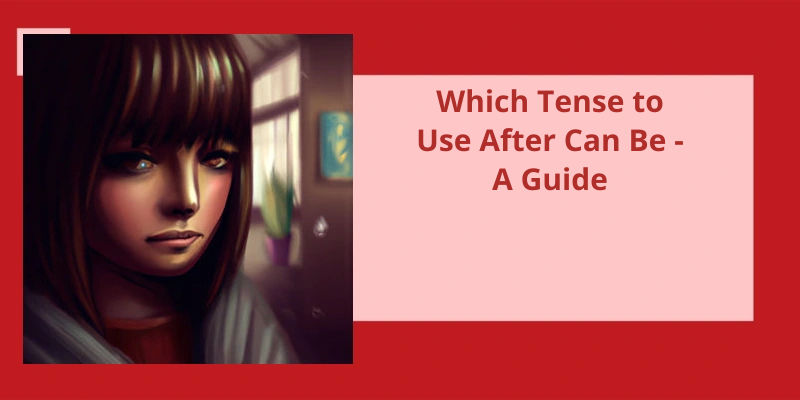One of the key components of English grammar is understanding the nuances of tense usage. One aspect that can be confusing is knowing which tense to use after the modal verb "can." This auxiliary verb is considered a modal verb because it doesn’t fit into the typical verb conjugation patterns. Unlike regular verbs that have multiple tenses, "can" only has one simple past tense, "could." However, when a past participle is required in a sentence, the expression "be able to" is used instead. This subtle difference in tense usage can have a significant impact on the meaning and clarity of a sentence. Understanding the proper usage of tense after "can" is an essential element in becoming a proficient English speaker or writer.
Which Verb Form Is Used With Can Be?
The use of proper verb forms is important in the English language. After all, it can affect the clarity and coherence of a sentence. One point of confusion for English language learners is which verb form to use with “can be.”. Fortunately, there are some rules to follow. When using the auxiliary verbs “can” or “could,” it’s important to use the base or root form of the verb. This means that after “can” or “could,” we should use the verb in it’s most basic form.
However, after “can be,” it’s possible to use the past tense. For example, it’s correct to say, “The cake can be eaten” or “The cake could be eaten.”. Both these sentences use the base form of the verb “eat.”. However, you could also say, “The cake can be eaten yesterday” or “The cake could be eaten last night.”. In this case, the past tense of “eat” is used after “can be.”
For example, “I can speak French” or “She could play the guitar.”
Overall, while English can be a tricky language to master, understanding the rules of verb form can go a long way in improving communication. By using the proper verb form after “can be,” you can express yourself clearly and effectively. So next time you’re unsure which form to use, remember that after “can” or “could,” use the base form, and after “can be,” you can optionally use the past tense.
As we delve deeper into the use of modal verbs, it’s important to understand the correct tense to use when indicating ability or possibility with the word “can”. While “can” is used in the present tense, “could” is used in the past tense. Understanding this distinction can vastly improve your communication skills and prevent confusion when expressing abilities or possibilities. Let’s explore this concept further.
Which Tense Is Used After Can?
Many English learners often struggle to understand the proper usage of auxiliary verbs such as can and could. These verbs are used to express ability, possibility, permission, and request, among other things. One of the most common questions is about which tense to use after can. The answer is that can is used in the present tense, while could is used in the past tense.
When using can to indicate ability or possibility, it’s followed by the base form of the verb. For example, “I can speak French” or “She can run fast.”. In these sentences, can is used in the present tense to express a present ability. Similarly, “I can help you with your homework” or “They can join us for dinner” indicates a present possibility.
For instance, “He could speak Italian when he was younger” or “She could play the piano very well.”. Here, could is used in the past tense to express a past ability. In a sentence like “We could go to the beach tomorrow,” could expresses a possibility in the future.
It’s essential to note that can and could can’t be used to express past events on their own. When talking about the past, the past simple tense should be used instead. For example, “I played football when I was a child,” not “I could play football when I was a child.”
The English language can be tricky, especially when it comes to verb tenses. While many people use “could” as the past tense of “can be,” there are actually other ways to convey the same meaning. In the following sections, we’ll explore different forms of “could” and how they can be used in everyday language.
What Is the Past Tense of Can Be?
One of the most basic rules of English grammar is that verbs change depending on the tense of the sentence. In particular, the past tense is used to describe actions or events that have already taken place. So what about the phrase “can be”? What’s the past tense of that?
It describes something that’s currently able to happen or exist. However, if you want to talk about the past version of that concept, you could use the phrase “could have been.”. For example, “The party can be loud” becomes “The party could have been loud” if youre talking about something that happened in the past.
It can be used in a conditional sense, to describe something that might have happened but did not. For example, “If I’d studied harder, I could have been accepted into that prestigious university.”. In this case, “could have been” isn’t really the past tense of “can be” — it’s just being used to talk about a hypothetical situation.
Another use of “could have been” is to express regret or disappointment. For example, “I was really hoping to win that award, but I didnt even make it to the finals. It could have been such a great opportunity for me.”. Again, this usage has nothing to do with the past tense of “can be” — it’s just a way of expressing a feeling.
So to sum up: there’s technically no past tense of “can be,” since it’s a present tense phrase. As with many things in English grammar, the answer depends on the specific context and what youre trying to convey.
Can You Use “Can Be” in the Future Tense and What Would Be the Appropriate Form?
- Yes, “can be” can be used in the future tense.
- The appropriate form would be “will be able to be”.
Source: “Could,” “can,” and “would” | Britannica Dictionary
Understanding the conjugation of modal verbs can be tricky, particularly with can. While can is the present tense, it can change to could in the past tense. However, when a past participle is required, the phrase be able to takes over. In this article, we’ll delve deeper into the unique world of can.
What Is the Past and Future Tense of Can?
In the present tense, can is used to describe ability, permission, or possibility. For example, “I can swim” means that I’m able to swim, “You can leave now” means that you’ve permission to leave, and “It can rain today” means that there’s a possibility of rain.
The future tense of can is formed by adding the word “will” before the base form of the verb. For example, “I’ll be able to swim” means that in the future, I’ll have the ability to swim. Similarly, “You’ll be able to leave” means that in the future, you’ll have permission to leave.
It’s important to note that can is a very versatile verb and has many different meanings depending on the context in which it’s used. Apart from it’s primary uses of ability, permission, and possibility, can is also used to express requests, suggestions, and offers.
It’s the simple past tense could, but no past participle. When a past participle is needed, the expression be able to is used instead.
Differences Between Can and Be Able to
“Can” is a simple present tense modal verb that expresses ability or possibility in the present. “Be able to” isn’t a modal verb but a verb phrase that conveys the same meaning. It’s used in situations where we need to express an ability in a particular tense, such as past or future.
It’s common to wonder if we can use past tense after “can”. However, it’s important to note that the past form of “can” is actually “could”. This form is typically used for the past simple of the verb, rather than directly following “can”.
Can We Use Past Tense After Can?
However, there are instances when “can” can be used in the past tense. This is when it’s combined with another verb in a past participle form to form the present perfect tense. For example, “I can’t believe I’ve eaten so much pizza.”. In this sentence, “can’t” is used in the past tense, but in combination with “believe” in the present perfect tense.
For example, “I can’t remember what happened yesterday.”. In this sentence, “cannot” is negating the action of “remember” which refers to an action in the past.
To avoid this confusion, it’s recommended to use “could” as the past form of “can” when referring to a single action in the past.
It’s best to use “could” or other past tense forms to clearly convey the intended meaning without confusion.
However, care should be taken to avoid confusion and it’s recommended to use proper past tense forms in formal writing and speech. Remember, language is constantly evolving and usage can vary, but clear communication is key.
Now let’s move on to exploring the various applications of the future tense in English grammar. While the future tense of ‘can’ may not exist, there are several other ways to express future actions and events effectively. From simple future to future continuous, read on to discover the nuances of different tenses and when to use them.
What Is the Future Tense of Can Be?
The use of different tenses in English grammar can be quite tricky, especially for non-native speakers. One of the tenses that can be a bit confusing is the future tense of the phrase “can be.”. Instead, a different phrase is used to express the future possibility of being able to do something.
For instance, the phrase “will be able to” is commonly used to indicate that someone will have the ability to do something in the future. This phrase is used to express the idea of a future possibility that may take some time to materialize. For example, if someone is recovering from an injury, we might say that they’ll be able to walk soon, indicating their gradual progress towards being able to walk again.
It implies that the person or situation being discussed will eventually lead to a positive outcome. Additionally, the phrase suggests that the future isn’t certain, and that there may be factors that could cause a change in the predicted outcome.
For example, we might say that a student will be able to pass the exam if they study hard, suggesting that the outcome is dependent on certain conditions being met.
This phrase suggests optimism and hope for the future and implies that the outcome is dependent on certain conditions being met. Overall, proper understanding and use of tenses is critical to accurate and effective communication in the English language.
Examples of Other Phrases Used to Express Future Possibility in English Grammar.
- It’s possible that…
- There’s a chance that…
- It may/might/could happen that…
- It’s conceivable that…
- It’s not unlikely that…
- It’s within the realm of possibility that…
- There’s a slim/good/high likelihood/probability that…
- It’s quite possible that…
- There’s every chance that…
- It’s probable that…
Conclusion
In conclusion, it’s important to note the unique nature of can as a modal verb and it’s limitations in terms of tenses. While it does have a simple past tense in could, it lacks a past participle and requires the use of be able to in such cases. This highlights the importance of understanding the nuances of different verb forms and the role they play in conveying meaning and clarity in language. As such, it’s crucial for writers and communicators to pay close attention to the tense they choose after can be in order to ensure accuracy and precision in their expression. By doing so, they can effectively convey their message while avoiding confusion and ambiguity in communication.






